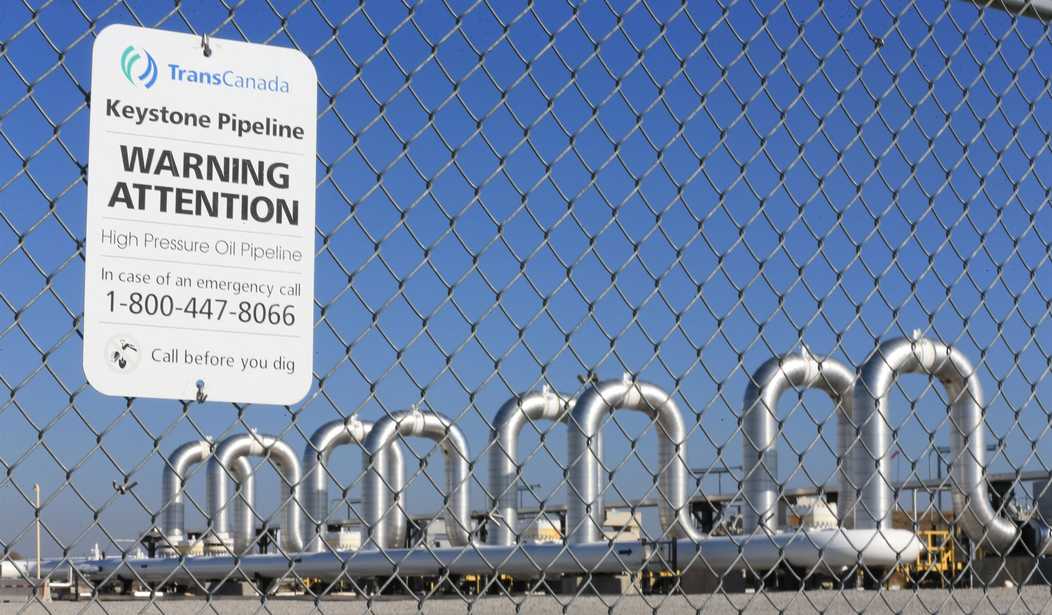"It's definitely not something that I'm proud of, but I may have been the first casualty of the 'Build Back Better' plan," explained Neal Crabtree, a pipeline welder and union member who testified before the House Oversight Committee on Thursday.
"Three hours after President Biden's inauguration, I lost my job on the construction of the Keystone Pipeline," Crabtree explained. "Now I realize this was only one project, but what I really feared was the consequences the decisions would have on my future. And now I see those fears being realized. Not only did I lose an opportunity for employment on the Keystone, but I'm losing employment opportunities."
"All this is happening while the demand for energy is rising — Build Back Better shouldn't mean the total neglect and destruction of our energy infrastructure as we know it," Crabtree said. "Instead of being built or being in service they're now canceled," he added of pipelines and other fossil fuel infrastructure projects. "They were canceled because of overregulation and in a push for a green new energy sector that just isn't capable or reliable enough to provide the energy that we need right now."
Crabtree, who's worked on pipelines for decades, stated how he too is feeling the price crunch brought on by growing inflation that's hitting Americans at the gas pump and in their utility bills.
"People from coast to coast are feeling the pain of rising energy prices and there seems to be no thought given to the hundreds of thousands of workers in this industry or the millions of products that we use every single day that, you know, are provided by fossil fuels," he said. "There shouldn't be a fear of a heating shortage in the northeast this coming winter, yet here we are."
Recommended
?? WATCH ??
— Oversight Committee Republicans (@GOPoversight) October 28, 2021
"I may have been the first casualty of the Build Back Better Plan"
Former Keystone Pipeline welder Neal Crabtree tells how Biden's failed policies harmed not only himself, but all Americans.
Democrats have no intention of helping Crabtree and thousands like him. pic.twitter.com/jiNSxUcqV8
"Rising prices are a direct result of the lack of infrastructure that it takes to get the products moved to where they're needed most and it's mainly pipeline construction," Crabtree said, highlighting the problems that are driving up fossil fuel costs — a similar situation to the supply chain crisis playing out at several American ports.
"Every penny in the increase of energy on Americans takes about a billion dollars out of the pockets of Americans over a year's time and I can't see how that's a popular decision right now," explained Crabtree. If the root causes of increased fossil fuel prices aren't addressed, "I believe that elections in the coming years are going to prove that point," he stated.
"The disruption of the Colonial Pipeline earlier this year should've proven just how important the work that myself and these companies do really is," Crabtree pointed out. "We took one pipeline that was down for one week and we saw the panic it caused. Why do we only have one pipeline servicing such an important part of this country," Crabtree asked rhetorically before giving the answer: "It costs more to permit and plan a new pipeline than it does to actually build one."
Crabtree isn't anti-green energy, though. He said he believes "it's going to take an all-of-the-above approach for our energy future" but that future doesn't mean demonizing the fossil fuel industry, something that is "only going to hurt the economy and the country."
On a more personal note, Crabtree also explained what the Biden administration's anti-fossil fuel energy agenda means to him and those in similar situations. "I belong to a union that specializes in pipeline construction and I've spent over 25 years developing the skills that I have and I'm compensated well for it," he explained. "The government's idea of shutting down my industry and retraining me in another career is not realistic — I'm too far in life to be starting over at an entry level position."
"There's a whole generation of workers coming up that if they want to pursue careers in green energy then I support that just like I support private companies' rights to develop green energy," he said again proving he's not anti-green energy. "What I don't support is the government limiting my employment opportunities in my chosen field, especially when the product is in huge demand."
"To sum this up, the administration is having a direct negative impact on energy prices in this country, they're having an impact on my ability to find work right now," Crabtree said. "My crisis right now isn't the climate. My crisis is the mortgage payments I have due every month, it's the food I need to put on my table, and it's the healthcare I need to provide to my family."
























Join the conversation as a VIP Member